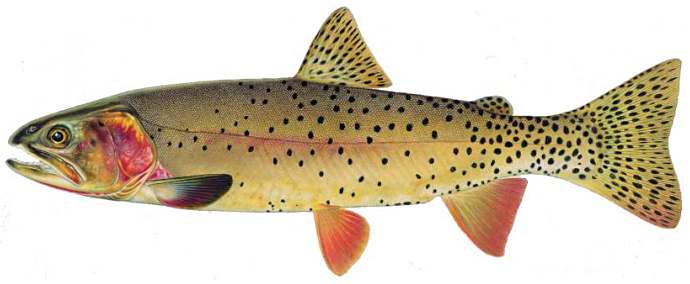IT'S A SIMPLE EXAMPLE
With A Complex Result
see the ecological transformation of
flathead lake
-------
.. By now, it would seem, that interested and informed fly fishers are aware of the Lake Trout situation in Yellowstone Lake. They are probably aware of the rapidly vanishing native species in Yellowstone National Park, as well... Sadly many of our neighbors, (guides and feather merchants as well,) have poo-pooed the need to do anything about the conservation of native species. They say, sadly: "A trout is a trout, is a trout. I just want to catch them."
 | ||
| Opossum Shrimp |
.. We read with great interest the recent article in NEW WEST. The story is about the complex interaction of species in Flathead Lake.
.. A recent paper published in the Proceedings of the National Academy of Sciences details how the introduction of a small non-native crustacean, (the Opossum Shrimp - Mysis diluviana,) has totally altered the ecology of a large lake.
.. It has changed algae production, nearly eliminated Kokanee Salmon, enabled Lake Trout population explosion, and endangered the native Bull Trout.
.. The paper details a classic example of a trophic cascade that has been well documented since it's inception in 1968.
 |
| LAKE TROUT |
.. Their population explosion provided an abundant food source for the introduced Lake Trout and allowed the Lake Trout population to grow to the point where the Kokanee Salmon and the Bull Trout are now being eaten at a rapid clip by the Lakers.
.. Another by product of the trophic cascade is the increased growth of algae.
.. We note that "simple" is seldom a concept that can be applied to ecological change. Both Yellowstone National Park and Flathead Lake, (as well as many other areas around the country and the world,) have suffered the consequences of actions in the past.MONEY QUOTE:"After the mysis explosion kokanee disappeared, bull trout declined, and lake trout came to be the dominant top predator, according to the study. This led to an increase in algal production because the shrimp ate up larger zooplankton, decreasing their levels and allowing smaller types of zooplankton to proliferate, Stanford explains. He says this changed the way the zooplankton “mow the lawn,” or consume algae: smaller zooplankton are less efficient consumers and allow algae room to grow."
.. "While the future might hold unexpected outcomes, for now fisheries managers have their hands full dealing with the legacy of shrimp and a misinformed decision from the past."
-------
 |
| LINK |




.jpg)




